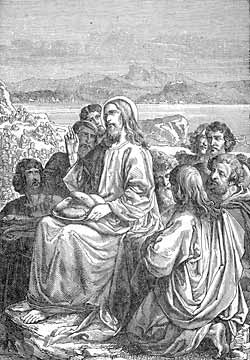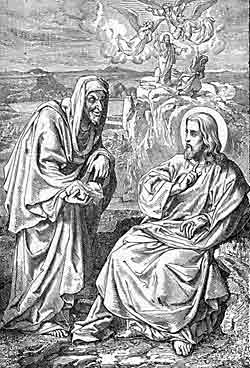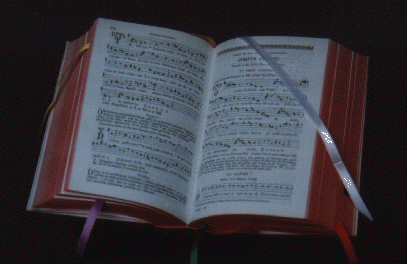I was reading the latest issue of the Kuala Lumpur archdiocesan newspaper HERALD of Feb 18, 2007, and chanced upon a letter to the editor written by an IJ nun. To Chinese readers of this blog, you may be familiar with the Chinese New Year tune Kong Si, Kong Si Nee Yah. Guess what? This sister composed a new set of lyrics to go with that tune. Here they are:
1. Let us come together
Wishing one another,
"Happy prosperous New Year"
As we greet and sing
Chorus: Kong Si, Kong Si!
Kong Si Nee Ya!
Kong Si, Kong Si, Kong Si Nee!
2. It's the time to give Thanks
To our God Almighty,
For His love and blessings,
As we praise and sing
3. It's the time of Reunion
With our dear family
Bonding and renewing ties,
As we dine together
Aargh.... my ears... they hurt! There are more.... but you do get the picture, right? I hope those liturgists at our local Novus Ordo parishes don't get funny ideas to use this during the Chinese New Year mass. (shudder)
This brought back some memories (not of the very good kind) when I was still attending Novus Ordo masses. I remembered we used to sing "Morning has broken" which was popularised by Cat Stevens (now Yusuf Islam) as the entrance song (yes, these are rightfully not hymns!). Then there's "Sing a song of joy" to that famous tune by Beethoven. Not to mention "A Mighty Fortress Is Our God" plus another which was outright heretical.
Now, you may wonder what's wrong with "A Mighty Fortress Is Our God"? Other than the fact that it was composed by Martin Luther, it is actually a fine hymn. However, it is the battle song of the Protestant Deformation, and it was said that the "ancient foe,....on Earth is not his equal" referred to in the lyrics was intended by Luther to refer to the Pope. Here's a fine article on hymnody that yours truly agrees with mostly, except for the part on "A Mighty Fortress Is Our God".
Protestant HymnsGet a group of Tridentine Mass devotees together, and sooner or later the subject of hymnody is sure to come up. Even among otherwise likeminded individuals, differences of opinion are sure to arise on the choice of music sung at Mass.
Let’s frame this discussion by identifying what is universally acceptable and unacceptable at a Traditional Latin Mass. We have mentioned in a previous column that an Offertory Hymn must be in Latin, as rubrics prescribe Latin to be used for anything “inside” the Mass. Essentially all Latin hymns are acceptable, as the relatively few that exist have long been used in the Mass. That leaves the Entrance and Recessional Hymns open to (but not requiring) the vernacular.
It’s easy to identify what is unacceptable: Many modern hymns cannot pass muster because of: 1) Cocktail-lounge melody (e.g.: “Be Not Afraid”); 2) Pop music style (“All Are Welcome”); 3) Lyrics excessively focused on oneself and not God (“Gather Us In”); 4) Presumptuous “Voice of God” lyrics (“I Am the Bread of Life”); 5) Lyrics that dilute or skirt true Catholic theology (“Gift of Finest Wheat”).
Likewise, it is easy to identify hymns that just “feel” Catholic, either through their longstanding use in Catholic liturgy (“Holy God, We Praise Thy Name”), or by their impeccably Catholic lyrics (“Hail, Holy Queen Enthroned Above”).
Differences in taste enter into the picture with certain Catholic hymns. Some consider “On This Day, O Beautiful Mother” and its May crowning ilk too sappy. But popular demand has resulted in their being played nonetheless.
Then there are the so-called “Protestant” hymns. This term means different things to different people. Virtually everyone agrees that “Amazing Grace” is a Protestant hymn, for example. It has Baptist origins, and its lyrics speak of a clearly non-Catholic theology, that of salvation by grace alone. It may be a fine hymn, far less offensive that some modern compositions used in Catholic parishes, but it is inappropriate for the Traditional Latin Mass.
Debate eventually seems to settle on one hymn in particular: “A Mighty Fortress Is Our God”. This hymn was composed by Martin Luther, father of the Protestant Reformation. As a result, to many, it is the quintessential Protestant hymn. However, on closer examination, its lyrics express nothing opposed to Catholic teaching. They speak of the reality of Hell, something many Catholics should contemplate more. Furthermore, its melody is as formal and inspirational as any “acceptable” Catholic hymn.
The previously discussed remarkable music program of the Boston Archdiocesan Choir School at St. Paul Church in Cambridge, Massachusetts regularly performs “A Mighty Fortress” and has included it in the hymnal they publish, Hymns, Psalms, and Spiritual Canticles. If liturgical music scholars such as Ted Marier and John Dunn consider this hymn acceptable, that is strong endorsement for the rest of us to use it.
(Editor's Note: Such an argument is not acceptable, see above for explanation.)Other hymns that make some people uncomfortable include “Lift High the Cross”, “O God, Our Help In Ages Past”, and “When I Survey the Wondrous Cross”, because their composers and/or lyricists were Anglicans. Like “A Mighty Fortress”, these hymns say nothing contrary to Catholic teaching; since their authors’ names are not readily recognized, thus they are often used in Catholic settings. They are not “flagship” Protestant hymns and thus don’t raise eyebrows like Luther’s masterpiece. We use such hymns frequently.
A recent discussion thread on the Catholic Answers Liturgy Forum points out that even some of the hymns thought of as clearly Catholic actually have Protestant origins. For example, “Holy, Holy, Holy”, “O Sacred Head Surrounded”, and “Hark! The Herald Angels Sing” have melodies, lyrics, or both composed by Protestants. Yet those hymns express Catholic beliefs more clearly than many of the modern hymns composed by the “St. Louis Jesuits”. If we ruled out the use of any hymn by a Protestant author, we might end up with a very small selection, indeed…a greater problem.
Things get all the more confusing when we consider that Johann Sebastian Bach, composer of so many great and inspiring organ preludes, fugues, and toccatas, was not Catholic. Virtually every Tridentine Mass site makes extensive use of Bach’s works. And some of his pieces were absolutely meant for Catholic use, for example his Magníficat. Are we to walk away from his vast body of work just because of his faith?
Extending the thought, should we even be in the church edifice we are in, when non-Catholics participated in its building? Of course not. We must draw boundary lines in reasonable places. Our music program endeavors to employ the best hymnody available to us. “A Mighty Fortress” is an excellent hymn which we would like to add to our rotation. But at the same time, we do not wish to upset or scandalize anybody by its use. So far, we have resisted using it, but perhaps we are overreacting. For all we know, some of you may want us to use it. Come up to the choir loft after Mass and let our organist know your thoughts on this matter, pro or con. Whether or not we eventually use “A Mighty Fortress”, rest assured that we intend to employ solely music that expresses the undiluted truths of the Holy Catholic Faith, regardless of its origin.
(Editor's Note: If Sacred Heart Choir sings that, it would be over my dead body!)
Source: http://detroitlatinmass.org/jospht/012107.pdf
 For March 11, 2007 which is Third Sunday in Lent, we are going to sing:
For March 11, 2007 which is Third Sunday in Lent, we are going to sing:

